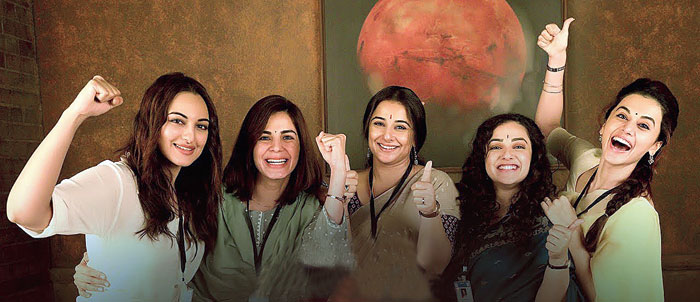In the written word and in the cinematic medium, women make for far more compelling subjects than men. This may seem like a sweeping generalisation, but not if you have just walked out after watching Mission Mangal. It’s the women that not only drive the film’s big idea — sending a satellite to Mars on a minuscule budget and against every kind of opposition possible — but also propel much of its drama. And that’s saying a lot about a film that has Akshay Kumar — who has now moved from sanitation and sanitary pads to space but continues in his quest to highlight made-in-India stories — in the middle.
A heavily fictionalised depiction of the 2013 Mars Orbiter Mission, called Mangalyaan, which saw India successfully send a satellite to the red planet on its first attempt — no mean feat, considering America had failed four times and Russia’s no-go count stood at eight when Mangalyaan happened — Mission Mangal is a classic underdog story, a crowd-pleaser of a film that rests a lot on sentimentality but ultimately turns out to be a rousing watch.
Directed by first-timer Jagan Shakti and with R. Balki doing writing duties, Mission Mangal is a textbook example of what the human mind is capable of when pushed against the wall. ‘Jugaad’ is the name of the game here, even when we are talking about one of the country’s most important space achievements. Mission Mangal simplifies the science, but thankfully doesn’t dumb it down, drawing analogies between space travel and everything from frying puris to recycling plastic waste to even a pattern on a cushion cover inspiring a fresh relook at the satellite’s trajectory through space. Some of it may come off as too simplistic, but the film abounds in jargon — from perigee to apogee and from Van Allen Belt to orbit-raising manoeuvre — rendering it an authentic look and feel.
The story is what you have watched in the trailer. After a failed attempt to launch a GSLV satellite into space, mission director Rakesh Dhawan (Akshay Kumar) is downgraded to a punishment posting of sorts and made in-charge of India’s Mars mission, an exercise that elicits neither enthusiasm nor funds from ISRO. Dhawan, ever ready with a quip and a song on his lips, tries to make the best of his situation — a scene in which he walks into the dilapidated room given to him for his new assignment and pretends that it is the surface of Mars is nicely done. But the mission gets a fillip only when Tara Shinde (Vidya Balan), a resourceful scientist always ready with a solution, steps in with her knowledge of home science and applies it to planning how a rocket could conserve fuel for a satellite launch.
The two assemble a ragtag team of scientists, but opposition arrives not only in the form of the group’s lack of drive — Rakesh and Tara are fuelled by passion, but for the rest it’s merely a job — but also an apathetic ISRO honcho (played by Dalip Tahil with a strange accent) who’s just arrived from NASA and considers ISRO to be a second-rung agency plagued by brain-drain.
Even with a man — a superstar to boot — leading the cast, Mission Mangal does well in letting the women shine, even though it reinforces some stereotypes. Each of the women fits a type — Sonakshi Sinha’s Eka is the sceptic who can’t wait to pack her bags and leave for NASA, Kritika (Taapsee Pannu) is torn between her job and her duty towards home and hearth, Neha (Kirti Kulhari) is the single Muslim woman struggling to find accommodation in the city while Varsha (Nithya Menen) is hounded by her mother-in-law for not having a child.
The makers also pack in references to inclusion, gender equality, religious intolerance and a woman’s right to make her own decisions. While some of it is pertinent, Mission Mangal becomes a tad bloated with the scenes showing Tara struggling with a chauvinist husband (Sanjay Kapoor) at home even as she unflinchingly goes about fulfilling her prized dream at work. Vidya Balan is the tour de force of the film, turning in an act both affecting and inspiring, with Akshay proving to be its backbone. Each of the other women are well cast, though their parts vary in terms of screen time.
Mission Mangal may be schmaltzy in parts, but there are laughs aplenty, mostly courtesy Sharman Joshi and H.G. Dattatreya, who play the men in this women-dominated mission. The film has its fair share of pop patriotic lines — “Scientist banne ka kya fayda agar mera science mere desh ke kaam nahin aa saka,” Akshay’s Dhawan says at one point (no surprises that a real-life footage of Prime Minister Modi pops in at the end... and no, Akshay doesn’t interview him here). Despite the obvious emotional manipulation, the last 20 minutes are guaranteed to bring a lump to your throat when the mission moves towards its final stages. And your heart does swell with pride when pictures of those who put us on the space map — among them APJ Abdul Kalam, the man who dreamt a dream and told us, “A dream is not what you see in your sleep, a dream is something that does not let you sleep” — flash on screen.











